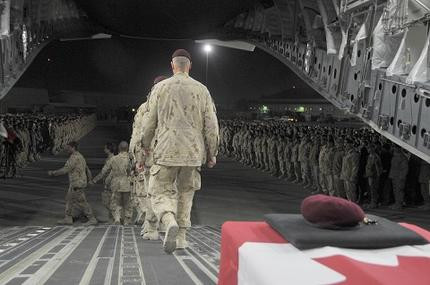Extending Canada’s Longest War
Liberal MP Defends Canada’s Decision to Remain in Afghanistan until 2014
For Canadians, June 2011 was supposed to mark the end of the war in Afghanistan.
However, in November of last year, the Harper government announced that after the withdrawal of combat troops from Afghanistan this summer, 950 Canadian troops would remain in country to help train police and military forces.
Liberal MP and Foreign Affairs critic Bob Rae has described his support for this decision as making a choice between “a bad thing and a worse thing.”
In a phone interview with The Link, Rae discussed the Canadian military’s training mission and making peace in Afghanistan.
According to Rae, a full withdrawal without preparing the Afghan government to take over military duties would be a worse outcome than the Conservative government’s plan.
“You need to build up the capacity of the state of Afghanistan […] to be able to provide for the needs of its own people,” said Rae. “One of the needs that we need to work on, obviously, is training police and training security.”
On his website Rae wrote that if Canadians want to help build schools and support women’s rights in Afghanistan, Canada’s training mission is necessary.
Some have argued that this approach is the wrong one. Greg Mortenson, an American humanitarian, has built schools for girls in Taliban-controlled areas of Afghanistan and Pakistan. He claims two of the reasons for his success is that he only hires local workers to build the schools and he avoids any contact with foreign militaries. This method, which differs greatly from NATO’s tactics, is why village elders and locals want to protect these schools, according to Mortenson.
Rae agreed that this is a valid approach but “you need both” ways of operating, and disagreed with critics who say that the military presence makes development more difficult.
“We also need to build the education system, we need to build up the health care system. There’s a whole range of things we need to do. One shouldn’t be […] saying ‘this precludes doing that’ or ‘we do this at the expense of all the others,’” he said.
Whether or not this is true, positive views of NATO forces have dropped significantly in the past year and violence has risen.
NATO officials expected that 2010, with the Obama administration’s surge of 30,000 troops, would bring more violence to Afghanistan and worsen the security situation.
“I’m sure there will be many more casualties; there’ll be an awful lot of violence. That’s, I’m afraid, the nature of the conflict,” said Mark Sedwill, the Senior Civilian Representative for NATO in Afghanistan, in an interview with BBC in early 2010.
The prediction turned out to be true. Reuter’s reported that last year was the most violent for Afghanistan since the beginning of the war in 2001. UN figures showed a 20 per cent rise in civilian casualties from the previous year with 2,412 killed between January and October of last year.
“One of the reasons that I strongly advocate [that Canada move] away from a combat role is that I think fundamentally the responsibility for any engagements—whether they’re military, police or security—have to belong to the people and institutions of Afghanistan,” said Rae.
Opinion polls of Afghan people suggest that this is what they want as well. A BBC and ABC News opinion poll conducted in 2010 found that large majorities of Afghans were confident in the government’s ability to provide security.
The same poll found that 36 per cent of people were confident in NATO’s ability to provide security and 52 per cent thought that NATO should start leaving this summer or sooner.
Whatever the opinions of the Afghan people are, NATO and Canada, in some form or another, will likely be staying in Afghanistan until at least 2014.
Despite Rae’s support for Canadian’s training mission, he is leery of previous foreign attempts to create democratic institutions.
“There have been […] historically many other interventions that have in the end failed because the gap between the people and the government simply became too large,” said Rae.
This article originally appeared in Volume 31, Issue 24, published March 7, 2011.



